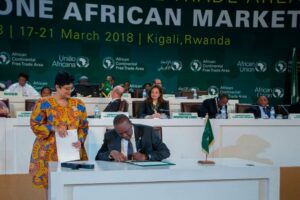
A Roadmap for Dispute Handling Among AfCFTA Member States
Nature of the AfCFTA and Dispute Resolution
Trade prosperity is a key economic goal for any Continent. This is a driving factor for nations to come together as a unified circle and attain this mission. The African Continental Free Trade Area (AfCFTA) is a nascent goods and services free trade zone that African Union (AU) member states created to forest greater intracontinental trade and investment to spurn economic integration and growth in Africa. Its enforcement was effective in May 2019, supplemented by additional protocols such as the Protocol on Trade in Services which have been provisionally agreed by a few states. Its long-term goal is to create a single market for goods, services, and capital including having one custom union but this cannot be reached if members are in dispute with one another.
Dispute resolution mechanisms are required in disagreement on the interpretation and application of the Protocol on Trade in Goods and Protocol on Trade in Services as member states may fail to have a common understanding of the content of provisions of the Agreement. It should be noted that the AfCFTA can only solve disputes among states that have formed part of the trade area like Tanzania with Kenya and not for non-member states, which is part of the flagship objective.
The essence of having dispute resolution mechanisms is to put an end to complaints and recreate peaceful relations similar to international settlements that desire to retrieve international relations among sovereign states. The United Nations Conference on Trade and Development (UNCTAD) Policy Brief analyzed the challenges of the AfCFTA dispute mechanism with a comparison to other RECs pinpointing all its challenges.
Handling State Parties’ Conflicts
Implementing the Protocol on Rules and Procedures on Settlement of Disputes as elaborated under Article 2 aims for a transparent, fair, and consistent dispute resolution process. Thus, with these rules in place, misunderstandings are to be resolved through proper legal procedures and principles acknowledged. On the other side, it will make the process much easier as the resolution body will have a guide on what to do.
By making more use of the Dispute Settlement Body (DSB) as per Article 5 of the AfCFTA can benefit from the establishment of a dispute settlement panel and an appellate body. This is to maintain surveillance of the implementation of rulings and recommendations of the panel and appellate body. This ought to be an impartial body that discharges conflict settlement duties and enhances stability by hearing each side’s complaints and coming up biding decisions.
This can be done by adopting amicable (friendly) ways to settle the member states indifferences rather than opting for legal litigation or violent measures. Article 7 of the Protocol on Rules and Procedures on Settlement of Disputes, provides consultation rules for states to resolve friendly and it is reasonable for parties to finish their misunderstanding peacefully through various means like negotiation. Even mediation is a referable measure available in the process which helps the parties reach an understanding through having a neutral party.
AfCFTA member states can also utilize the reliefs available for affected or unsatisfied parties with the decisions or panel reports on the resolution process. Other measures are usually available upon dissatisfaction on several things such as only state parties having the opportunity to appeal against the Panel report, as per Article 21 of the This gives more room to challenge any decision that is likely to affect the interest of members. Other reliefs are available including the DSB which can order compensation, recommend conformity, or suspend obligations for non-compliance. This act can relieve the victimized state from any harm, be it physical or non-physical.
Last, dispute resolutions can be pursued by formulating a panel where the disputing members have failed to resolve their matter through alternative Dispute Resolution (ADR). The panel, usually appointed, must set in motion the process of a formal resolution of the dispute and reach a determination.
In a nutshell, the African Union flagship project is a great free trade area that can only develop by having political stability within. Dispute resolution can be effectively manifested by observing the above recommendations that also support the legal framework of the African Union trade system despite the challenges that have been explained by various sources.



